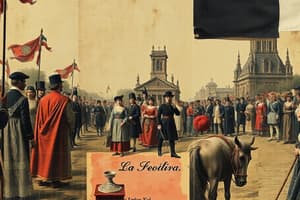Podcast
Questions and Answers
Which of the following best describes the composition of the Third Estate in pre-revolutionary France?
Which of the following best describes the composition of the Third Estate in pre-revolutionary France?
- Representatives from all three estates in equal proportion.
- The vast majority of the population, including peasants and commoners. (correct)
- Primarily clergy members and religious figures.
- Mainly nobility and aristocracy with significant land holdings.
How did the heavy taxation, particularly the Taille, contribute to the French Revolution?
How did the heavy taxation, particularly the Taille, contribute to the French Revolution?
- It encouraged the nobility and clergy to contribute more to public works.
- It increased financial burden and dissatisfaction among the common people, fueling demands for reforms. (correct)
- It stabilized the French economy by providing consistent revenue.
- It fostered contentment among the common people due to fair distribution.
Why was the Estates General convened by King Louis XVI in 1789?
Why was the Estates General convened by King Louis XVI in 1789?
- To address the economic crisis in France and seek solutions. (correct)
- To plan a military campaign against neighboring countries.
- To celebrate the king's birthday with representatives from all estates.
- To discuss social reforms proposed by the clergy.
Which event is most closely associated associated with the Jacobins?
Which event is most closely associated associated with the Jacobins?
Which statement best explains the execution of King Louis XVI?
Which statement best explains the execution of King Louis XVI?
How did life in pre-revolutionary France differ across the estates?
How did life in pre-revolutionary France differ across the estates?
What were the primary consequences of the French Revolution?
What were the primary consequences of the French Revolution?
Which of the following statements best describes the long-term impact of the French Revolution?
Which of the following statements best describes the long-term impact of the French Revolution?
Flashcards
Three Estates
Three Estates
The social classes in pre-revolutionary France: clergy, nobility, and commoners.
Taille
Taille
A heavy land tax imposed on the common people in France.
Estates General
Estates General
A representative assembly of the three estates convened to address France’s economic crisis.
Reign of Terror
Reign of Terror
Signup and view all the flashcards
Execution of King Louis XVI
Execution of King Louis XVI
Signup and view all the flashcards
Pre-revolutionary living conditions
Pre-revolutionary living conditions
Signup and view all the flashcards
Consequences of the Revolution
Consequences of the Revolution
Signup and view all the flashcards
Liberty, Equality, Fraternity
Liberty, Equality, Fraternity
Signup and view all the flashcards
Study Notes
The French Revolution: Causes
- The French Revolution was a period of major political and social change in France.
- The existing social order was challenged by the people, who demanded a more just and equitable society.
- French society was organized into three estates:
- First Estate: Clergy (Church members)
- Second Estate: Nobility
- Third Estate: Peasants, commoners and everyone else making up the vast majority
Taxation and Unrest
- French people faced heavy taxation.
- The Taille (a land tax) was a significant financial burden on the Third Estate.
- Common people demanded reforms and fair treatment.
- Increasing dissatisfaction led to the Revolution.
The Estates General
- The Estates General was a representative body including delegates from each estate.
- It was convened by King Louis XVI in 1789 to address an economic crisis.
- Estates General aimed to represent all different Estates.
Causes of the Revolution
- Bad Harvests and Rising Prices: Poor harvests and increasing bread prices led to widespread hardship.
- Desire for Social Change: The Third Estate demanded equality and an end to the privileges of the nobility and clergy.
The Reign of Terror
- The Jacobins, a radical group, seized power and instigated a period of violence called the Reign of Terror.
- Severe punishments were meted out to those who opposed the revolution.
Execution of King Louis XVI
- King Louis XVI was executed in January 1793 for treason.
- This followed his attempted escape and efforts to regain power.
Living Conditions Before the Revolution
- Life before the revolution had significant disparities between the estates.
- The nobility and clergy enjoyed privileges and exemptions from taxation.
- The common people faced heavy financial burdens and social inequality.
Consequences of the Revolution
- The French Revolution led to far-reaching consequences including Napoleon's rise to power.
- Monarchy was abolished.
- Principles of liberty, equality, and fraternity became important to French identity.
- The French Revolution was a pivotal moment in history impacting the political and social landscape across the world.
Studying That Suits You
Use AI to generate personalized quizzes and flashcards to suit your learning preferences.
Related Documents
Description
Explore the causes of the French Revolution, including social order, heavy taxation on the Third Estate, and the role of the Estates General. Understand the demands for reform and fair treatment that led to widespread unrest and revolution.



